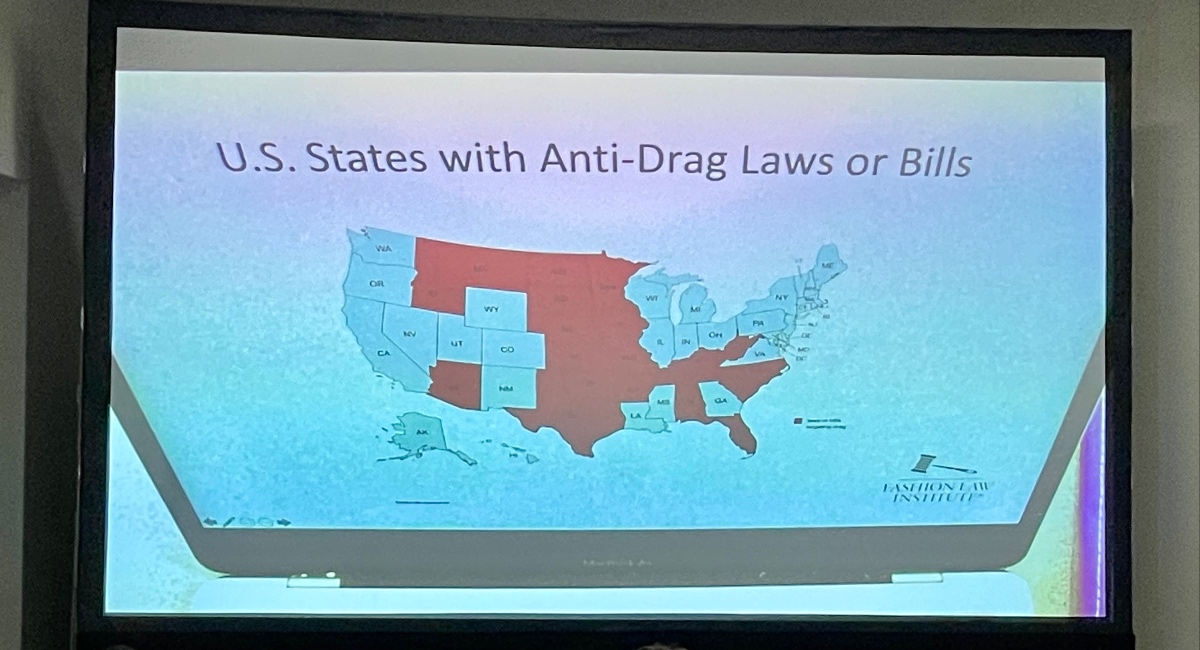With the constitutionality of Montana’s anti-drag law in question, we have decided to post a San Diego Comic-Con 2023 panel that takes a deep dive into how the law may impact drag performers and cosplayers.
Last year’s San Diego Comic-Con may have had the largest number of queer panels in the con’s history. I haven’t collected hard evidence—at least, not yet—that SDCC 2023 broke any records; however, anecdotal evidence suggests that the Comic-Con committee emphasized queer creators and content this year. For example, as a Prism Comics’ board member, I know that the printed version of the Prism Comics LGBTQ+ Guide to Comic-Con 2023 was more than double its size in previous years due to the number of panels, signings, people, and events of queer interest that were scheduled to appear at SDCC 2023.
Of the many queer panels this year, one of my favorites was “Defending Comics Today: Anti-Drag Laws and the Freedom to Cosplay,” which examined how laws banning drag performances could affect cosplay, geek fashion, and fandom. Comic Book Legal Defense Fund interim director Jeff Trexler was scheduled to appear as a moderator but could not make it at the last minute. Instead, the moderator was Professor Susan Scafidi, a pioneer of the study of fashion law and founder of Fordham Law School’s Fashion Law Institute in New York City, New York. Scafidi lead panelists Chad Hatter, a Colorado-based costume designer and cosplayer; Miss Claire Voyance, a drag queen with her own production company from Southern California; and Jen King, cosplayer, Comic Book Legal Defense Fund board member, and co-owner of the Eisner-nominated comic shop Space Cadets in Houston, Texas.
RuPaul’s Drag Race all-star Mayhem Miller was listed as a panelist on the official SDCC 2023 schedule, but she was not there. No reason was given for Mayhem Miller’s absence.
Anti-drag laws and the freedom to cosplay
Scafidi started Thursday’s panel with a PowerPoint presentation about the current wave of anti-drag legislation sweeping America, using a red map of the U.S. states most impacted by anti-LGBTQIA+ sentiment. (Note from Scafidi: It’s important to remember that not all the anti-queer legislation currently proposed will pass and that the courts will overturn some of the legislation that does pass. Recently, in Tennessee, the state’s anti-drag law was struck down by a Donald Trump-appointed judge for being “unconstitutionally vague,” reported PBS.)
According to Scafidi, of the states that have proposed and/or passed anti-drag legislation, Montana’s law is the worst because it bans drag queen story hours and denies government funding to local libraries if they choose to host a reading despite the law. Furthermore, a statute of limitations of ten years allows anyone to sue on behalf of a minor.

Under House Bill 359, which Montana Governor Greg Gianforte signed into law in May 2023, “drag queen” means a male or female performer who adopts a flamboyant or parodic feminine persona with glamorous or exaggerated costumes and makeup, making it the first state to explicitly ban both drag kings and queens from reading to children in schools and libraries that receive public funding. As Scafidi discussed the law in more detail, Hatter expressed frustration, exclaiming, “That’s the most puritanical garbage I’ve ever read.”
“Barbie cannot even read Barbie books to your kids,” joked the panelists about how Montana’s legislation could apply to a performer of any gender who dresses too flamboyantly, pointing out the law’s vagueness.
In comics, entertainment, and theater, drag is historically more acceptable. For example, Madame Fatal, created by artist/writer Art Pinajian, is a male vigilante who dresses up as an elderly woman to fight crime (and solve the case by dinner time), making the 1940s character the first cross-dressing hero.
Another American pop culture hero in drag is Mrs. Doubtfire. “There isn’t a movie more American than Mrs. Doubtfire,” said Miss Claire Voyance. “It’s Robin Williams and apple pie. And then, the movie ends with a man in drag hosting a children’s television show.”

In 1979, Williams was also the first man to perform with the Denver Broncos cheerleading squad, Pony Express, in one of their uniforms.
Off the stage, people have been much less tolerant of drag—even in fandom. In 2016, Tokyo Comic-Con banned men from dressing as female characters, initially issuing gender-specific color-coordinated cosplay registration badges to enforce the rule. However, the ban only lasted a few days.
“If they’re coming for drag, they’re coming for everyone.”
When we think of anti-drag legislation, it’s not about drag. Instead, it’s about attacking transgender people. Although some of these current laws may only seem a kind of evil, the next law will be evil, and the one after that will be even more evil. This type of fear, however, creates a chilling effect and causes self-censorship.
If they’re coming for drag, they’re coming for everybody, agreed the panelists.
“As a drag queen, even walking into the convention center, I am scared,” said Miss Claire Voyance, who added that drag queens are getting doxed online, events are getting canceled, and police departments are calling drag clubs to say there are credible bomb threats. In sum, the situation is dire for the drag community—and queer community as a whole—across the United States.
“I’m so angry all the time,” Hatter said about the situation of the LGBTQIA+ community in America. “I don’t care about your kids. I don’t want to know your kids. I have white carpets. I live like Marie Antoinette.”
Instead of addressing problems facing American children (e.g., gun violence, mass slaughter, and Catholic sexual abuse cases), conservative policymakers tap into the bigotry of their base to win votes by creating an us versus them environment. This type of political environment creates fear, causing a chilling effect and self-censorship of LGBTQIA+ content.
Luckily, tourism boycotts seem to be working. For example, Florida is experiencing problems with its economy. People are not traveling to the state because Gov. Ron DeSantis and the Florida legislature have enacted controversial laws, including attacks on LGBTQIA+ books, gender-affirming care bans, and drag show restrictions. (To learn more about the impact of Florida’s anti-LGBTQIA+ laws on the tourism industry and the state’s economy, check out the Forbes article, “DeSantis’ Controversial Policies Spark Florida Convention Cancellations—As Tourism Shows Signs Of Slowing” by Alison Durkee.)
Speaking of Florida, one panelist wondered about the impact of the state’s bigoted laws on fan conventions—and even Halloween. What does Halloween look like in these conservative states? What about people dressed up as Barbie? Ken? Harley Quinn? All those characters would fit Montana’s anti-drag definition to a T.
What can concerned citizens do about the suppression of queer speech?
Near the end of the panel, someone in the audience asked, “How do we deal with it?”
Miss Claire Voyance noted that the LGBTQIA+ community and allies are not dealing with reason and that the people who support these laws do not accept facts as facts. Thus, even though it shouldn’t be a queer person’s job to teach these people, talking to them individually is the only way to impact someone’s belief system.
King added that if you find challenges coming to your school and library, contact CBLDF. Even if the CBLDF cannot help, the organization is part of a First Amendment rights media coalition, so they can help direct you toward someone who can help.
Many people fighting drag believe in free speech, an intrinsic contradiction. Scafidi suggests bringing this up, subjecting the individual to their own “Kobayashi Maru.”
The panel’s advice ended with Hatter saying, “Don’t be quiet; silence equals death.”
POST-SDCC 2023: On October 13, 2023, District Court Judge Brian Morris granted a preliminary injunction blocking enforcement of House Bill 359, saying it targeted free speech and expression and it was written to “disproportionally harm not only drag performers but any person who falls outside traditional gender and identity norms” reported Politico.








